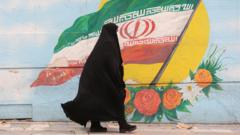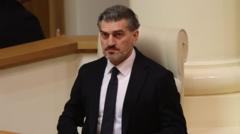A Paris court has convicted French-Cameroonian author Charles Onana and his publisher for denying the Rwandan genocide, marking a pivotal moment in the legal approach to Holocaust denial in France.
Writer and Publisher Convicted for Denying Rwandan Genocide in France

Writer and Publisher Convicted for Denying Rwandan Genocide in France
French court finds Charles Onana and his publisher guilty under a law penalizing the denial of genocide, stirring debates on freedom of expression and historical narrative.
In a landmark ruling, a Paris court has convicted Charles Onana, a French-Cameroonian author, and his publisher, Damien Serieyx, for denying the Rwandan genocide, a decision that raises questions regarding freedom of speech and historical interpretation. The court imposed fines totaling nearly $15,000 and mandated further payments exceeding $11,000 to three human rights organizations that brought suit against them.
The judgment, which classifies the authors’ content as “public challenge to the existence of a crime against humanity,” is the first of its kind under French laws prohibiting genocide denial. Central to the case was Onana's book, “Rwanda, the Truth about Operation Turquoise — When the Archives Speak,” in which he asserts that the Events of 1994 do not constitute genocide and dismisses the French government's role in the conflict.
The court found specific passages in his book to be in contravention of the law, arguing that they misrepresented historical facts. Among the contentious statements, Onana labeled the prevailing narrative of a Hutu-led genocide as “one of the biggest scams of the 20th century.” Notably, he reframes the term “genocide” in quotes throughout his work, which the court interpreted as an attempt to undermine its significance.
Onana and Serieyx have both indicated that they intend to appeal the conviction. Their case not only touches on intricate legal precedents but also opens up a broader discussion about the limits of historical discourse and the responsibilities authors bear when addressing sensitive and deeply impactful events like the Rwandan genocide.
This ruling has incited widespread debate across various platforms, reflecting diverging perspectives on the balance between preserving historical memory and protecting individual expressions of belief. Advocacy groups and activists are hailing the decision as an essential affirmation of the legal standards that guard against the dissemination of hate and historical revisionism, while critics argue that it poses a serious threat to free speech and academic inquiry.




















